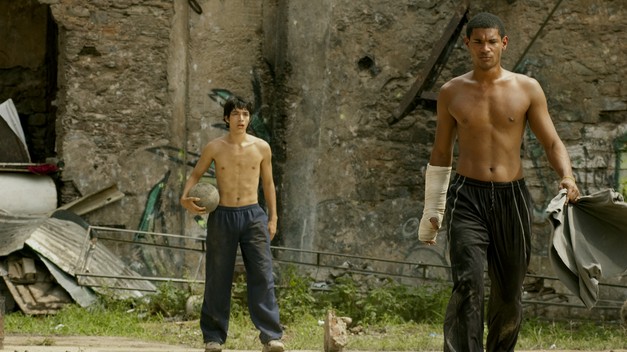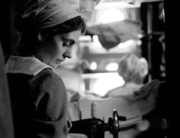
Fernando Moreno, left, and Eliú Armas in HERMANO (Music Box Films)
Venezuela’s 2010 selection for the Best Foreign Language Film Oscar is a bizarre hybrid, equal parts City of God and The Mighty Ducks. On the one hand, the pessimistic yarn about brotherhood and the difficulties in escaping the barrio’s cycle of violence has all the usual fixings of a gangster tale set in the developing world. You have your grubby slum setting in a major Latin American city; a cast of sweaty, lean, and often shirtless youth; overexposed film stock meant to mimic the southern sun; and the jumpy hand-held camerawork that now has become a kind of shorthand for third world authenticity. On the other hand, it’s an underdog sports melodrama, brimming with all the genre’s typical tropes, including the idea that all it takes to turn around a losing game is an inspiring talk from a beloved coach. Goal!
Daniel (Fernando Moreno) is a foundling raised by Graciela (Marcela Girón), a loving Latin mama who found him in a trash heap after her son, Julio, mistook his mewing for a cat’s (hence his nickname, Gato). Daniel grows up to be fair and saintly, while Julio (Eliú Armas) is dark and volatile. As teenagers, they play for the local soccer league, and while training they get noticed by a scout for a professional team in Caracas—it’s their ticket out of the slums. They find guidance from their tough and wise coach, the guy who almost made it to the big time, and who could have stepped out of any sports movie in the last 20 years if it weren’t for a slight wrinkle—he’s cheating on his wife with the boys’ mom.
But their hardscrabble happiness isn’t to last. An unstable teammate and flunky of the local crime lord shoots their mother by accident while trying to intimidate some street kids. Daniel witnesses the shooting, but keeps mum for fear of getting his brother drawn into a blood feud. His brother misunderstands this, thinking it’s a sign of Daniel’s willingness to subordinate everything to his coldhearted ambition to go pro. Meanwhile, Daniel is stuck in the let’s-be-friend zone with a pretty neighborhood girl who needs his help. She has been knocked up by a small-time ballplayer and now wants an abortion. ¡Ay carumba!
The movie often makes you wonder how much respect its creators have for the audience. In almost every one of his scenes, Daniel reminds you that “Ma saved my life,” just in case you have the attention span of a gnat. Characters also make observations that are both nearly impossible for them to make and brain-dead obvious to the viewer. At one point, the soccer team emerges onto the field after an inspiring pep talk from the coach, and a spectator remarks, “Something has changed.” Indeed it has. And I trust it’s not a spoiler if I say Daniel’s friend is talked out of the abortion at the last minute, because people don’t get abortions in movies that aren’t two and a half hours long, depressing, and Romanian.
It’s called Hermano, after all, so naturally the friendship between the two brothers is the center of the tale. It’s sometimes touching, but too often their rivalry plays out in trite one-on-one soccer matches where the give and take of the game is meant to somehow reflect the clash of their personalities. The soccer stuff, in general, is edited too quickly to make much sense of. The league final that serves as the climax is pure melted queso, even though a surprisingly effective twist saves it from resembling every other last-minute, come-from-behind victory committed to film since the invention of cinema. And then there’s Marocho (Benito Benites), the barrio boss. I laughed when he first appeared because he looks like some telenovela gangster cliché, but he’s more interesting and less one-dimensional than his gimlet eye and seedy goatee would suggest. He’s portrayed, in a way, as a real community leader. He’s vulgar and crude—in one scene he smashes someone’s hand with a hammer for insulting him—but he means well. A bit like the movie, perhaps?
















Leave A Comment